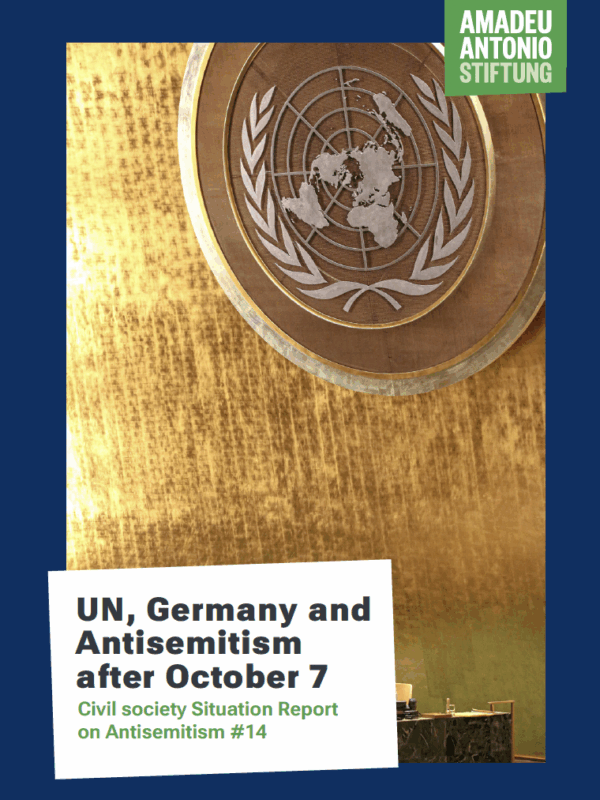Since October 7, the UN has repeatedly been in the headlines: UNRWA staff were directly involved in the massacre, UN organizations have been silent for too long in the face of the sexualized violence of the day, Israeli hostages report being held captive in UN buildings, UN representatives accuse Israel of genocide and resolutions against Israel have been passed again and again in the General Assembly – without even once condemning Hamas by name.
The bitter result: the UN has failed in the face of October 7. Instead of putting out fires, it has in some cases poured oil on the fire. The UN’s actions have consequences for Jews and anti-Semitism-critical initiatives and organizations in Germany and are therefore the subject of Civil Society Situation Report Anti-Semitism #14. Jews feel abandoned by the organization.
The English version of the report is available digitally.
Our core observations:
- Resolution: Hostility towards Israel. The UN, particularly its General Assembly, reflects the sum of its parts. The majority of UN member states are autocratic regimes ruled by dictators who reject democracy, the rule of law and human rights. These majorities have shaped the UN’s Middle East policy for decades through various anti-Israel resolutions. An institution whose influence is based on voting can only be as principled as its voting members. This dynamic contributed to the UN’s failure after October 7.
- Inverted reality. While Israel faces delegitimization, Hamas is downplayed and its atrocities relativized. No UN General Assembly resolution has ever explicitly condemned Hamas by name, and a proposal to this effect was rejected shortly after October 7. UN representatives often frame Palestinian terror as resistance and do not recognize Hamas as a terrorist organization, which reflects the trivialization of terror heard across streets in Germany.
- The UN as a source of legitimacy. The antisemitic attitudes of high-ranking elected officials and the UN’s decades-long anti-Israel bias provide legitimacy for anti-Zionist ideology. As a perceived moral authority of integrity, the UN sets cues for various political milieus – including in Germany. From accusations of genocide to the denial of sexualized violence on 7 October to calls for a right of return, anti-Israeli activists can cite the UN as a source of legitimacy.
- Destabilizing the Middle East. Many Jewish communities feel disappointed and even abandoned by the UN. They view the UN as driving regional destabilization in the Middle East in various ways: through unilateral resolutions, actions that foment conflict over Palestinian refugees or through UNRWA school textbooks that have repeatedly been shown to reproduce antisemitic narratives.
- Ineffective raison d’état. Germany has systematically voted against Israel or abstained in voting on UN General Assembly resolutions relating to Israel and Palestine since October 7 – even via votes completely opposed to its frequently cited support for Israel’s raison d’état. Concurrently, Germany is one of the largest donors of the much-criticized UNRWA, highlighting the disconnect between Germany’s voting behavior and foreign policy in the UN and the oft-invoked raison d’état of Israel.
